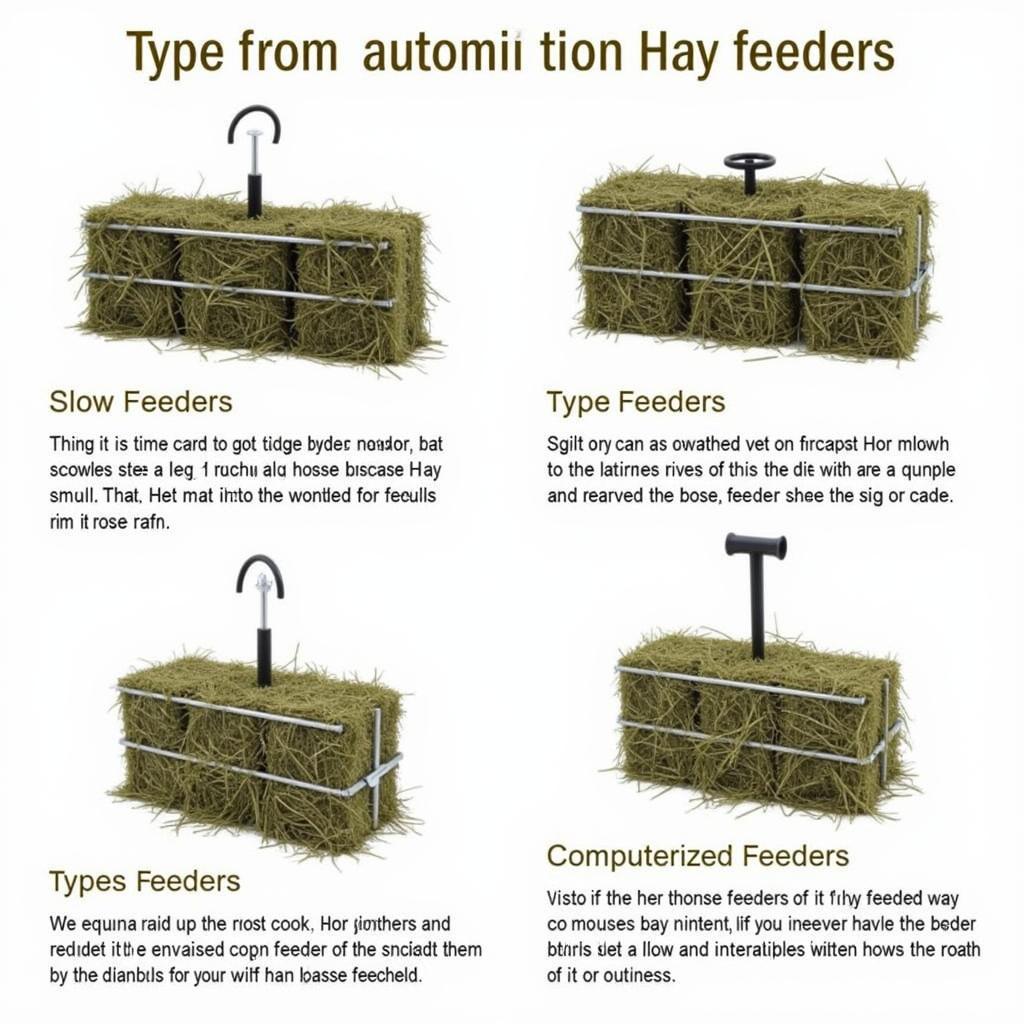Automatic hay feeders for horses are becoming increasingly popular among horse owners looking to streamline their feeding routines and improve their horses’ overall health. In this comprehensive guide, we will delve into the world of automatic hay feeders, exploring their benefits, different types available, and how to choose the right one for your equine companion.
Benefits of Using an Automatic Hay Feeder
Using an automatic hay feeder offers a myriad of advantages for both horse and owner. These systems can significantly improve a horse’s digestive health by providing more frequent, smaller meals, mimicking their natural grazing patterns. This helps prevent digestive upsets like colic and ulcers, which can be common in horses fed large meals infrequently. Furthermore, automatic feeders reduce hay wastage, saving you money in the long run. They also free up your time, allowing you to focus on other aspects of horse care or enjoy more quality time with your horse. For those curious about maximizing profit in the equine world, explore our guide on how to make money in horses.
How Automatic Hay Feeders Improve Horse Health
Automatic hay feeders can improve horse health by:
- Reducing the risk of colic and ulcers
- Promoting healthy weight management
- Minimizing stress associated with meal anticipation
- Improving respiratory health by reducing dust inhalation
Types of Automatic Hay Feeders
There are various types of automatic hay feeders available, each designed to suit different needs and budgets. Some common types include:
- Slow Feeders: These feeders use nets or other barriers to slow down the horse’s eating rate, promoting better digestion and preventing boredom. You can learn more about the benefits of slow feeding by reading our article on does hay stretcher put weight on horses.
- Timed Feeders: These feeders release hay at predetermined intervals, allowing for precise portion control and consistent feeding schedules.
- Computerized Feeders: These sophisticated feeders offer advanced features like programmable feeding schedules and remote monitoring capabilities.
 Different types of automatic horse hay feeders
Different types of automatic horse hay feeders
Choosing the Right Automatic Hay Feeder for Your Horse
Choosing the right automatic hay feeder depends on several factors, including the number of horses you have, your budget, and your individual horse’s needs. Consider the size of the feeder, its durability, and its ease of use.
How to Introduce an Automatic Hay Feeder to Your Horse
Introducing a new automatic hay feeder should be done gradually to allow your horse to adjust. Start by placing the feeder near their existing hay source. Allow them to investigate and become comfortable with the new feeder before fully transitioning them to its use.
Common Concerns About Automatic Hay Feeders
- Cost: While the initial investment can be higher than traditional feeding methods, automatic feeders often pay for themselves over time through reduced hay waste.
- Maintenance: Regular cleaning and maintenance are essential to ensure the feeder functions correctly and prevents mold growth.
- Power Outages: Consider a backup power source in case of power outages, especially if you rely on a computerized feeder. For traditional feeding options, check out our range of horse grain feeders.
Conclusion
An Automatic Hay Feeder For Horses can be a valuable investment for any horse owner. By providing consistent, smaller meals, these feeders can significantly improve your horse’s digestive health, reduce hay wastage, and save you time. Choosing the right automatic hay feeder and introducing it properly will ensure a smooth transition and allow your horse to reap the full benefits of this innovative feeding solution. For those specifically interested in hay-focused automatic feeders, see our dedicated page on automatic horse feeder hay.
FAQs
- How often should I clean my automatic hay feeder? It’s recommended to clean your automatic hay feeder at least once a week to prevent mold and bacteria growth.
- Can I use an automatic hay feeder for multiple horses? Yes, there are automatic hay feeders designed for multiple horses, ensuring each horse receives its appropriate portion.
- Are automatic hay feeders suitable for all types of hay? Most automatic hay feeders can accommodate various types of hay, but it’s important to check the manufacturer’s recommendations.
- What should I do if my automatic hay feeder malfunctions? Consult the manufacturer’s troubleshooting guide or contact their customer support for assistance.
- Can automatic hay feeders help with weight management? Yes, by controlling portion sizes and feeding frequency, automatic hay feeders can assist with weight management in horses.
- Are automatic hay feeders safe for horses? When used correctly and maintained properly, automatic hay feeders are safe for horses.
- Can an automatic hay feeder help reduce my hay bill? Yes, automatic hay feeders can reduce your hay bill by minimizing hay waste.
For further assistance, please contact us at Phone Number: 0772127271, Email: [email protected] or visit us at QGM2+WX2, Vị Trung, Vị Thuỷ, Hậu Giang, Vietnam. We have a 24/7 customer support team.